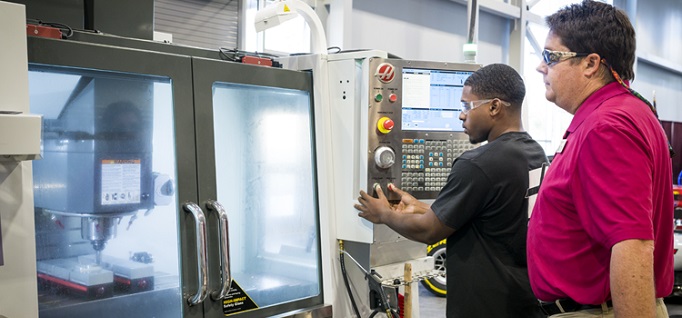80 hours to employment
By AACC 21st Century Center Staff
November 2, 2017
A two-week program at Greenville Technical College trains students for an in-demand job.
Upstate South Carolina has a strong environment for advanced manufacturing. Due to a massive number of retirements and employee fluctuation, employers are struggling to find qualified people to fill CNC (computer numerically controlled) operator positions. Greenville Technical College’s (GTC’s) new “80 to Work” program speeds up the training process to get those positions filled.
GTC is partnering with Machining Training Solutions (MTS) to offer the intensive, two-week training program. Program completers leave with an entry-level skill set, as well as six months of mentoring and a clearer pathway to an associate degree.
Among the many skills learned in the 80-hour program are safety, math for machining, blueprint reading, metrology and tooling.
“This is a strong opportunity for people who are willing to spend two weeks developing skills that should translate into an entry-level position paying approximately $17 or more an hour,” Jermaine Whirl, vice president for the college’s Economic Development and Corporate Training division, said in a release.
Seven organizations have already committed to guaranteeing interviews for program completers, Whirl said. MTS provides the simulations and mentoring. SC Works is recruiting the students, funding the training and screening candidates with soft skills training, drug testing and work keys testing included. Duke Energy Foundation became a launch partner, giving GTC $50,000 for supplies for participants, including books and access to simulation. Duke’s gift also offsets the cost of mentorship.
Other businesses and organizations are showing interest in making 80 to Work a pre-employment program, as well.
This isn’t the first fast-training program GTC has launched. The college’s Quick Jobs with a Future program offers short-term job training (less than three months) for more than 40 different jobs in fields such as health care, manufacturing and computers and IT.
How do you accelerate training for your students? Sound off at LinkedIn.



